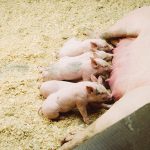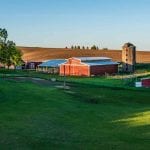Aaron Hummel is a research scientist at KWS Group. He is a graduate of Hillsdale College and earned his PhD in molecular, cellular, and developmental biology from Iowa State University. He lives in St. Louis, Missouri, with his wife and two children.
How would you describe your work?
I’m a molecular biologist working in agricultural biotechnology—a field that’s had a significant effect on agriculture even though it’s only existed for 35 years. In my work, I develop and improve the performance of crops by making genetic modifications, which means that I need to know what causes plants and plant cells to live, develop, and reproduce. As you might imagine, it can be a slow process.
As an image-bearer of God, how does your work reflect some aspect of God’s work?

It’s a great privilege to study the minute details of life designed and made by the Creator. In a single day and by a single command, he imagined, designed, and made all the plant species that originally populated the earth. He then caused the plants to grow and bear good food for his people to enjoy. In his image, I help to grow good food for people, too. Yet it takes our team years of hard work to change just one aspect of one species of plant. His work, in contrast, is truly amazing.
How does your work give you a unique vantage point into the brokenness of the world?
In a perfect world, the food supply isn’t threatened by pests, diseases, weeds, or other harmful things. But we live in a fallen world, where farmers work “by the sweat of [their] brow” a ground that produces “thorns and thistles” (Gen. 3:17–19). Technological innovations, like tractors, have helped to create more food, more reliability, and more efficiency. Biotechnology has improved productivity, too, and has added environmental benefits. Lots of sweat, though, is still required to obtain food efficiently.
Jesus commands us to “love our neighbors as ourselves.” How does your work function as an opportunity to love and serve others?
Agricultural biotechnology benefits anyone who eats by making food more abundant and less expensive. The world population is expected to reach 9 billion by 2050, which will require nearly doubling the current level of food production. Of all the potential in this field, the most exciting aspect is the opportunity to produce nutritionally fortified foods (for example, Golden Rice) that can reduce malnutrition and disease in parts of the world.
Editors’ note: TGCvocations is a weekly column that asks practitioners how they integrate their faith and their work. Interviews are condensed and edited.
Is there enough evidence for us to believe the Gospels?
 In an age of faith deconstruction and skepticism about the Bible’s authority, it’s common to hear claims that the Gospels are unreliable propaganda. And if the Gospels are shown to be historically unreliable, the whole foundation of Christianity begins to crumble.
In an age of faith deconstruction and skepticism about the Bible’s authority, it’s common to hear claims that the Gospels are unreliable propaganda. And if the Gospels are shown to be historically unreliable, the whole foundation of Christianity begins to crumble.



































